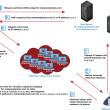Leverage Cloud App Development and DevOps to boost business agility, scalability, and security. Optimize operations, deploy faster, and future-proof your business with innovative AI, ML, and IoT integrations.
In the digital age, businesses must remain agile, scalable, and secure to stay competitive. Cloud app development, paired with DevOps, offers the tools and strategies necessary to meet these demands. These technologies enable companies to optimize operations, deploy applications faster, and safeguard their data, making them critical for success in today’s fast-paced marketplace.
How Cloud App Development Can Future-Proof Your Business
Cloud app development allows businesses to build scalable, flexible, and cost-effective applications that grow and evolve with their needs. With cloud platforms, businesses can eliminate the limitations of traditional infrastructure, enabling faster deployment and real-time updates. These apps can also be accessed from anywhere, providing businesses with the agility required to operate globally and adapt to changing market conditions.
In addition to scalability and flexibility, cloud app development future-proofs businesses by integrating advanced technologies like artificial intelligence (AI), machine learning (ML), and the Internet of Things (IoT). These integrations allow companies to leverage data-driven insights, automate processes, and enhance customer experiences, setting the foundation for long-term growth and innovation.
Cloud-Native Development: Building Apps Designed for the Cloud from the Ground Up
Cloud-native development refers to building applications specifically designed to run in cloud environments. Unlike traditional apps that are migrated to the cloud, cloud-native apps are built with scalability, resilience, and flexibility in mind from the start. This approach takes advantage of cloud features such as microservices architecture, containers, and continuous integration/continuous deployment (CI/CD) pipelines.
Microservices architecture breaks down applications into smaller, independent services that can be developed, deployed, and scaled independently. This results in faster development cycles and more efficient resource management. Containers, such as Docker and Kubernetes, provide an isolated environment for these services, ensuring consistency across different cloud environments. These technologies enable cloud-native apps to be more adaptable, ensuring they can scale rapidly and respond to changes in demand.
Why Partnering with a Cloud App Development Company is Essential for Business Scalability
Partnering with a cloud app development company is key to unlocking the full potential of cloud technologies for business scalability. These companies possess in-depth expertise in cloud platforms and tools, ensuring that the applications they develop are customized to meet the unique needs of your business.
A cloud app development company will optimize your application for both performance and scalability, allowing your business to easily expand services, accommodate more users, or integrate new functionalities as needed. Their specialized knowledge helps businesses avoid costly errors and inefficiencies, accelerating time to market and driving sustainable growth. Moreover, these companies provide ongoing support, ensuring that your cloud app stays secure and adapts to evolving technological and business demands.
The Role of DevOps Services in Accelerating Your Cloud Application Deployment
DevOps, a combination of development and operations, plays a pivotal role in cloud application deployment by fostering collaboration between development and IT teams. The goal of DevOps is to streamline the development lifecycle, automate processes, and accelerate application delivery. For cloud applications, DevOps services allow businesses to deploy apps faster, improve quality, and reduce downtime.
DevOps practices, such as automated testing and continuous integration, enable teams to identify and fix issues early in the development cycle. This reduces the risk of errors during deployment and ensures that applications are consistently reliable. Additionally, infrastructure as code (IaC) tools like Terraform and Ansible allow for the automated provisioning and management of cloud infrastructure, further accelerating the deployment process.
The Benefits of Integrating DevOps Solutions into Cloud App Development
Integrating DevOps solutions into cloud app development brings numerous advantages. First and foremost, it enables faster and more frequent releases, allowing businesses to deploy updates and new features quickly. This is especially important in today’s competitive environment, where customer needs and market demands are constantly changing.
DevOps also enhances collaboration between teams, ensuring that development, operations, and quality assurance work together seamlessly. This collaboration leads to fewer bottlenecks, improved efficiency, and more reliable applications. Automation, a key aspect of DevOps, reduces manual tasks, minimizes errors, and improves security by ensuring that every deployment follows best practices and adheres to compliance requirements.
Cloud App Development: The Foundation for Digital Transformation
Cloud app development is at the core of digital transformation. It provides businesses with the infrastructure and tools needed to modernize operations, deliver innovative services, and enhance customer experiences. By moving applications to the cloud or building cloud-native apps, businesses gain the flexibility and scalability needed to experiment with new technologies and business models.
Cloud-based apps also enable businesses to access real-time data, making it easier to make informed decisions and respond to market trends. This data can be used to optimize processes, improve customer engagement, and create new revenue streams. For companies embarking on digital transformation, cloud app development is not just an option—it is a necessity.
Cloud Security: How a Cloud App Development Company Ensures Data Protection
Security is a top priority for any business operating in the cloud, and cloud app development companies take extensive measures to protect data. They design applications with built-in security features, such as encryption, access controls, and threat detection, to safeguard sensitive information. Moreover, these companies ensure compliance with industry standards and regulations, such as GDPR, HIPAA, and PCI-DSS, to protect businesses from legal and financial risks.
Cloud app development companies also implement automated security testing throughout the development process to identify and mitigate vulnerabilities early. Additionally, they monitor applications continuously to detect potential threats and take proactive measures to prevent breaches. By working with a trusted cloud app development company, businesses can ensure that their applications are not only high-performing but also secure and compliant with industry standards.
Conclusion
In conclusion, cloud app development, supported by DevOps practices, is essential for businesses looking to scale, innovate, and stay competitive in the digital age. By partnering with the right cloud app development company and integrating DevOps solutions, businesses can accelerate their digital transformation, improve application deployment, and protect sensitive data, all while staying ahead of the curve in an ever-changing technological landscape.









